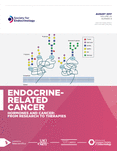Perspectives for immunotherapy in endocrine cancer
- 1Department of Endocrinology and Metabolism, University Hospital Essen, University of Duisburg-Essen, Essen, Germany
- 2Endocrine Tumour Center at West German Cancer Center (WTZ), Essen, Germany
- 3Department of Dermatology, Venereology and Allergology, University Hospital Essen, University of Duisburg-Essen, Essen, Germany
- 4German Cancer Consortium (DKTK), Heidelberg, Germany
- Correspondence should be addressed to D Führer; Email: Dagmar.fuehrer{at}uk-essen.de
-
Figure 2
T-cell activation in a lymph node after antigen presentation by APC via TCR/MHCII complex and co-stimulatory signal B7. Right: CTLA-4 binding to B7 together with TCR complex results in T-cell inactivation. Left: Anti-CTLA-4 antibodies block the interaction of CTLA-4 and B7 and thereby confer T-cell activation. MHC, major histocompatibility complex; TCR, T-cell receptor.
-
Figure 3
Interaction of T cells with tumor cells within the tumor microenvironment. Right: Tumor cells expressing PD-L1/2 are able to inactivate T cells via PD-1 pathway. Left: Tumor cells lose this ability when PD-1 and/or PD-L1/2 are blocked by antibodies and an appropriate T-cell response occurs resulting in killing of tumor cells. MHC, major histocompatibility complex; TCR, T-cell receptor.
- © 2016 Society for Endocrinology












